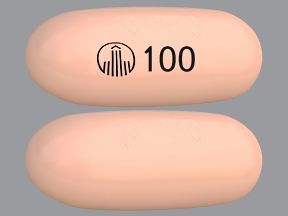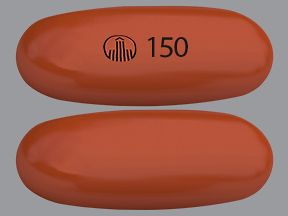Ofev (nintedanib) is a brand-name drug that’s prescribed for certain lung diseases in adults. Ofev comes as a capsule that’s typically taken twice per day. The dosage can vary depending on whether you have any other medical conditions.
Ofev belongs to a drug class called kinase inhibitors. Ofev is not available in a generic version.
Keep reading for specific information about the dosage of Ofev, including its strengths and how to take the medication. For a comprehensive look at Ofev, see this article.
Note: This article describes the typical dosage for Ofev provided by the drug’s manufacturer. When taking Ofev, always follow the dosage your doctor prescribes.
The information below describes the typically recommended dosage of Ofev and other details about the drug.
Ofev form
Ofev comes as an oral capsule.
Ofev strengths
Ofev comes in two strengths:
- 100 milligrams (mg)
- 150 mg
Typical dosages
The following information describes the Ofev dosage that’s commonly prescribed or recommended. However, be sure to take the dosage your doctor prescribes for you. Your doctor will determine the best dosage to fit your needs.
Dosage for certain types of lung disease
The typical Ofev dosage in adults is 150 mg twice per day.
The dosage is the same for all the drug’s approved uses. These include idiopathic pulmonary fibrosis and related conditions. To learn about Ofev’s other uses, see this article.
Long-term treatment
Ofev is meant to be taken as a long-term treatment. If you and your doctor determine that Ofev is safe and effective for you, you’ll likely take it long term.
If you have questions about Ofev treatment, talk with your doctor.
Below are answers to some commonly asked questions about Ofev.
How does the dosage of Ofev compare with the dosage of Esbriet?
The recommended dosage for Ofev is 150 milligrams (mg) twice per day. The recommended dosage for Esbriet (pirfenidone)* is 801 mg three times per day. However, doctors prescribe a low dosage of Esbriet to start. Then, they’ll gradually increase it over a 2-week period to reach the dosage that’s right for you.
If you have additional questions comparing Ofev and Esbriet dosages, talk with your doctor or pharmacist.
* Esbriet is approved by the Food and Drug Administration (FDA) to treat idiopathic pulmonary fibrosis. Ofev is also approved by the FDA for this use.
Is the dosage of Ofev different for older adults?
No, the dosage of Ofev isn’t different for adults ages 65 years and older. In clinical trials, the drug’s effectiveness and safety were similar in older adults and adults less than 65 years.
However, as with most drugs, older adults may have a greater sensitivity to Ofev. So if you’re age 65 years or older, you may have an increased risk of side effects* with Ofev. If you develop side effects, your doctor may adjust your Ofev dosage. To learn more, see the “Factors that can affect your dosage” section just below.
Talk with your doctor if you’d like to know more about your Ofev dosage.
* For details about Ofev’s side effects, see this article.
The Ofev dosage your doctor prescribes will depend on several factors. These include:
- how well your liver works
- whether you experience side effects with Ofev
- whether you have other medical conditions
Dosage adjustments
Your doctor may decrease your Ofev dosage if your liver isn’t working as well as it should. So before starting treatment, your doctor will check your liver function. Then, they’ll determine the right dosage for you. If you have moderate or severe liver disease, your doctor likely won’t recommend Ofev.
Your doctor may also adjust, pause, or stop your Ofev treatment if you develop side effects. (To learn about possible side effects of Ofev, see this article.) It’s important not to change your Ofev dosage without first speaking with your doctor.
Ofev comes as an oral capsule that you’ll swallow whole with water or another liquid. Be sure to take it with food.
You’ll take Ofev twice per day, about 12 hours apart. It may be helpful to take Ofev around the same time of day, such as morning and evening. This helps maintain a steady level of the drug in your body so Ofev can work effectively.
When taking Ofev, do not chew, open, or crush the capsules. If you come into contact with the contents in the capsule, wash your hands right away. This is because the active ingredient within Ofev may be absorbed through your skin. And this type of contact with the drug may cause unwanted side effects. To learn about possible side effects of Ofev, see this article.
If you have trouble swallowing capsules, see this article for tips on how to take this form of medication. You can also talk with your doctor or pharmacist.
ACCESSIBLE DRUG LABELS AND CONTAINERSSome pharmacies offer labels with large print, braille, or a code you scan with a smartphone to convert text to speech. If your local pharmacy doesn’t have these options, your doctor or pharmacist might be able to recommend a pharmacy that does.
If you’re having trouble opening medication bottles, ask your pharmacist about putting Ofev in an easy-open container. They also may recommend tools that can make it easier to open bottles.
If you miss a dose of Ofev, skip it and take your next dose at the regular time. Do not make up for the missed dose by taking two doses at the same time.
To help make sure that you don’t miss a dose, try using a medication reminder. This can include setting an alarm or putting a note where you’ll see it, such as on your bathroom mirror or bedside table. You could also download a reminder app on your phone.
It’s important that you do not take more Ofev than your doctor prescribes. For some medications, taking more than the recommended amount may lead to side effects or overdose. To learn about side effects of Ofev, see this article.
If you take more than the recommended amount of Ofev
Call your doctor right away if you believe you’ve taken too much Ofev. Another option is to call America’s Poison Centers at 800-222-1222 or use its online tool. If you have severe symptoms, immediately call 911 or your local emergency number, or go to the nearest emergency room.
The dosage in this article is the typical dosage provided by the drug’s manufacturer. If your doctor recommends Ofev for you, they’ll prescribe the dosage that’s right for you. Always follow the dosage that your doctor prescribes.
As with any drug, never change your dosage of Ofev without your doctor’s recommendation. If you have questions about the dosage of Ofev that’s best for you, talk with your doctor.
Besides learning about dosage, you may want other information about Ofev. These additional articles might be helpful:
- More about Ofev. For information about other aspects of Ofev, refer to this article.
- Side effects. To learn about side effects of Ofev, see this article. You can also look at the Ofev prescribing information.
- Cost. For information about Ofev and cost, review this article.
- Details about your condition. For details about lung disease, see our lists of respiratory system and pulmonary system articles.
Disclaimer: Medical News Today has made every effort to make certain that all information is factually correct, comprehensive, and up to date. However, this article should not be used as a substitute for the knowledge and expertise of a licensed healthcare professional. You should always consult your doctor or another healthcare professional before taking any medication. The drug information contained herein is subject to change and is not intended to cover all possible uses, directions, precautions, warnings, drug interactions, allergic reactions, or adverse effects. The absence of warnings or other information for a given drug does not indicate that the drug or drug combination is safe, effective, or appropriate for all patients or all specific uses.


